Unit 3 Tomorrow’s world Grammar and usage(1)课件(35张PPT)
文档属性
| 名称 | Unit 3 Tomorrow’s world Grammar and usage(1)课件(35张PPT) |  | |
| 格式 | zip | ||
| 文件大小 | 689.2KB | ||
| 资源类型 | 教案 | ||
| 版本资源 | 牛津译林版 | ||
| 科目 | 英语 | ||
| 更新时间 | 2020-01-10 09:07:44 | ||
图片预览


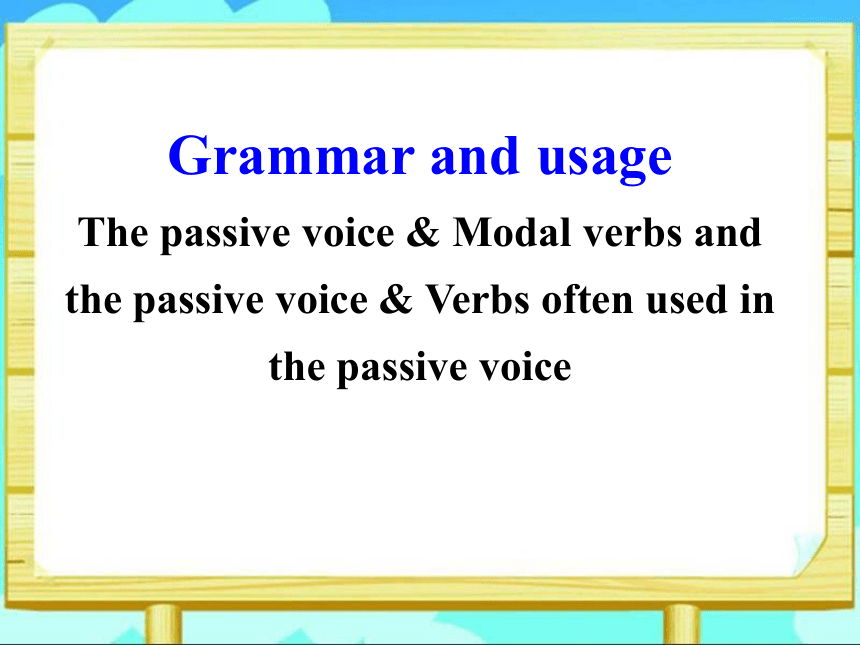
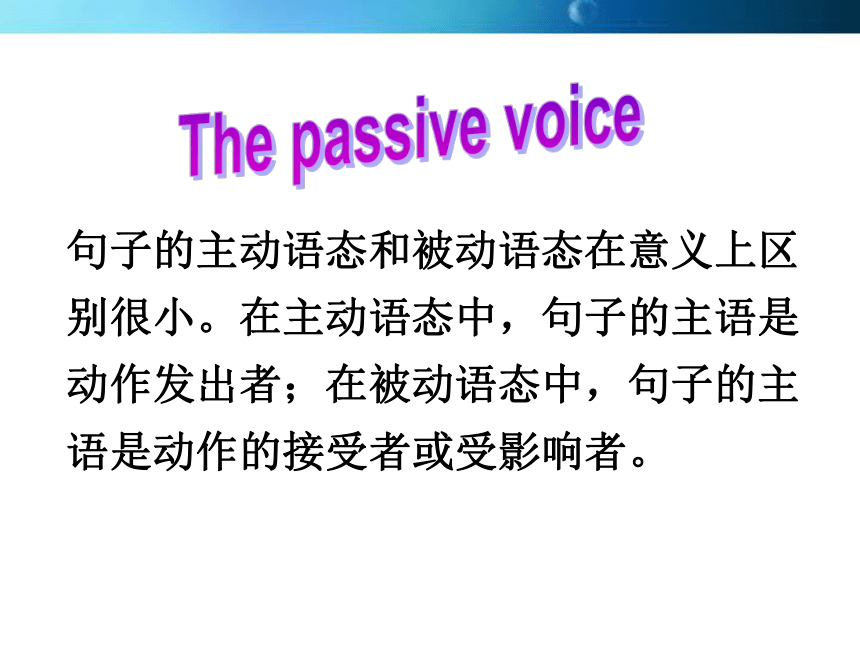



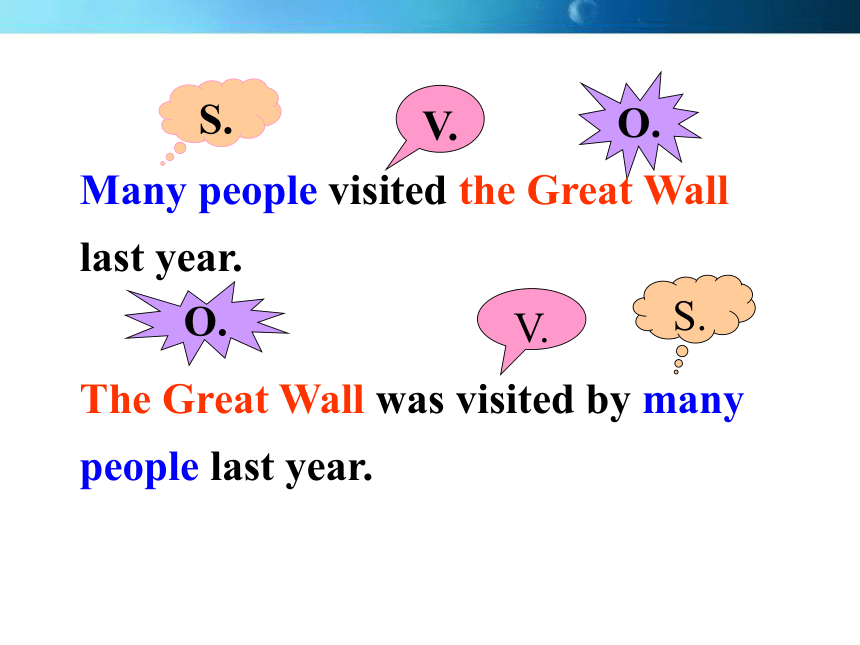

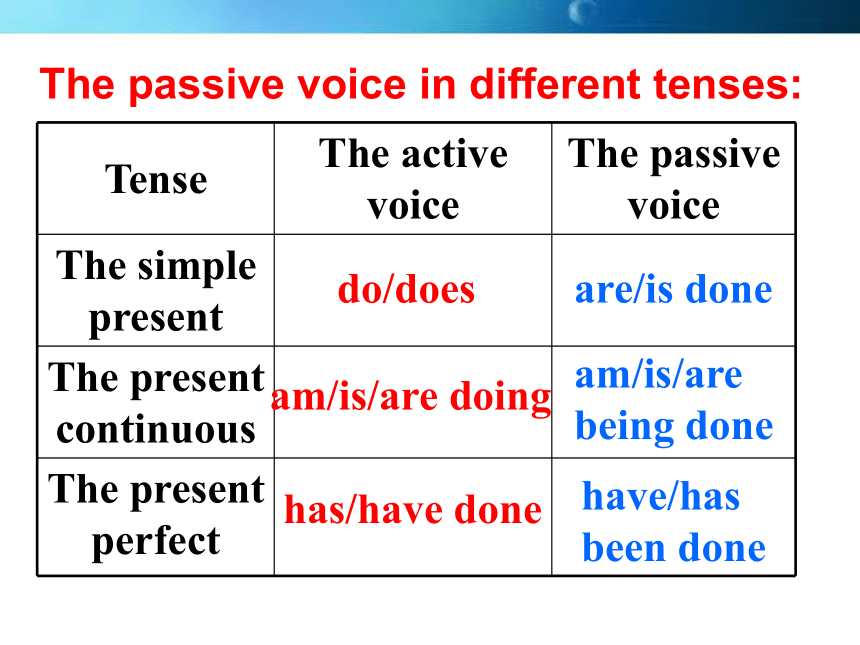
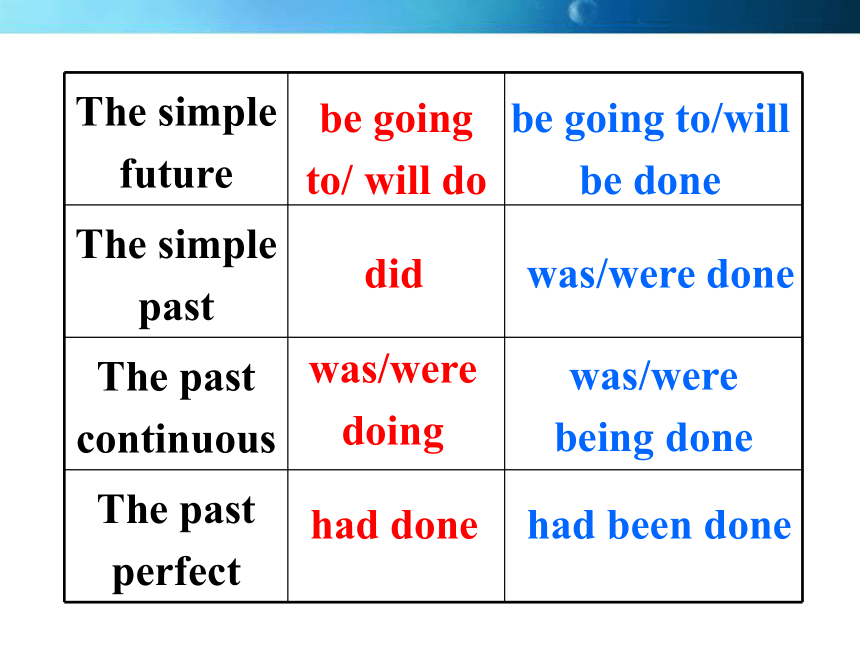
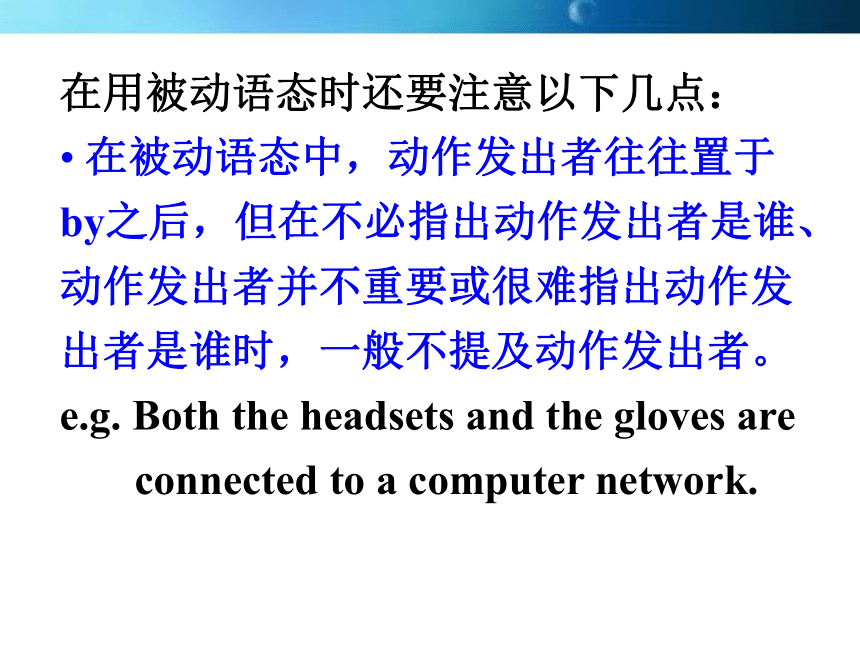
文档简介
课件35张PPT。Unit 3Unit 3
Tomorrow’s world Grammar and usage
The passive voice & Modal verbs and the passive voice & Verbs often used in the passive voice句子的主动语态和被动语态在意义上区别很小。在主动语态中,句子的主语是动作发出者;在被动语态中,句子的主语是动作的接受者或受影响者。The passive voiceThe lovely robots attracts the visitors.The visitors are attracted by the lovely robots.S.V.O.O.V.S.The Great Wall was visited by many people last year.S.V.O.O.V.S.Many people visited the Great Wall last year.被动语态的基本形式是 be + 过去分词。通过改变be的时态,可以构成不同时态的被动语态。
e.g. Food is kept in the fridge.
The glass was broken by the boy.The passive voice in different tenses:do/doesare/is doneam/is/are doinghas/have doneam/is/are being donehave/has been donebe going to/ will dodidwas/were doinghad donebe going to/will
be donewas/were donewas/were being donehad been done在用被动语态时还要注意以下几点:
在被动语态中,动作发出者往往置于by之后,但在不必指出动作发出者是谁、动作发出者并不重要或很难指出动作发出者是谁时,一般不提及动作发出者。
e.g. Both the headsets and the gloves are
connected to a computer network. 在 give,lend,offer,send,tell和 show 等动词后,可带有两个宾语,分别指人和指事物。当带有这些动词作谓语的句子变为被动语态时,通常用指人的宾语做句子的主语。有时也可用指事物的宾语做句子的主语。e.g. Our teacher often tells us some interesting stories in English.
We are often told some interesting stories in English.
Some interesting stories are often told to us in English. 在主动语态中,有些动词后常接宾语和不带to的动词不定式。在被动语态中,则使用带to的动词不定式。
e.g. I often hear the girl play the piano in the afternoon.
The girl is often heard to play the piano in the afternoon. 在被动语态中,有时get可用来代替be,如get changed,get dressed和get hurt等。
e.g. My bike got stolen last night.
You’d better get changed quickly,
as the party will begin soon.
The eggs seem to have got broken. 有些动词可用主动语态形式来表示被动意义。
e.g. This sweater washes well.
The pen writes smoothly.
The kind of computer sells well in China. 表示状态的动词不能用被动语态。
e.g. I like pop songs and often listen to them.
He has a big house near the river.
You can depend on her to deal with the situation.一些特殊的被动语态句型:
It + 动词的被动语态形式 + that 引导的从句
e.g. It is said that he will recover soon.
It is believed that the three missing sailors have drowned.
主语 + 动词的被动语态形式 + 动词不定式
e.g. The Sun was once thought to travel around the Earth.常用于这类句型的动词有say,believe,report,suppose,know和prove等。Read the information on Page 49 and complete the report on the event.Answers:
1. ________ 2. ______________________
3. _____________ 4. _________________
5. _____________ 6. _________________
7. _______________ 8. _______________
9. ______________
10. _______________________are beingthe Electric Wear Companybeen developedwas inventedare usedbeen completedwill be producedwill bebeen announcedare cleaned/can be cleaned1. 情态动词的被动语态形式可用于谈论能力、可能性、职责和允诺等。
e.g. Firefighters could be trained using RealCine.Modal verbs and the passive voice2. 情态动词的被动语态形式的构成是在情态动词后加be和过去分词。e.g. Computer can work out the position
of the user at any time.
e.g. The position of the user can be
worked out at any time.情态动词+不带to的动词不定式情态动词+be+过去分词Read the table on Page 50 and note the
use of these modal verbs in the active
and passive voices.Read the first report on Page 50 and
complete the second.Answers:
1. ______________ 2. ______________
3. ______________ 4. ______________
5. _________________can be reducedmust be takenmust be wornmay becomeought to be reducedSome verbs are often used in the passive voice and fun_ction like adjectives.
e.g. The children are getting excited about the coming holiday.
Don’t you get tired of arguing about the same thing all the time?Verbs often used in the passive voiceLook at the timeline showing the history of
Napster and complete the article on Page 51.
Answers:
1. ______________ 2. _______________
3. ______________ 4. _______________
5. _______________ 6. _______________
7. ______________ 8. _______________bored withinterested inwas foundedwere employedwas surprised atwas accused ofwas closed downwas purchased1. It remains _____ whether Jim’ll be
fit enough to play in the finals.
A. seen B. to be seen
C. seeing D. to see被动语态练习2. — I don’t suppose the police know
who did it.
— Well, surprisingly they do. A man
has been arrested and _____ now.
A. has been questioned
B. is being questioned
C. is questioning
D. has questioned3. — Your job ___ open for your return.
— Thanks.
A. will be kept B. will keep
C. had kept D. had been kept4. Tom sounds very much ____ in the job,
but I’m not sure whether he can
manage it.
A. interested B. interesting
C. interestingly D. interestedly5. The flowers _____ sweet in the botanic
garden attract the visitors to the
beauty of nature.
A. to smell B. smelling
C. smelt D. to be smelt6. Professor James will give us a lecture
on the Western culture, but when
and where _____ yet.
A. hasn’t been decided
B. haven’t decided
C. isn’t being decided
D. aren’t decidedHomework1. Review what we learned today.
2. Finish exercises on Page 108 of the
Workbook.
3. Preview Task.
Tomorrow’s world Grammar and usage
The passive voice & Modal verbs and the passive voice & Verbs often used in the passive voice句子的主动语态和被动语态在意义上区别很小。在主动语态中,句子的主语是动作发出者;在被动语态中,句子的主语是动作的接受者或受影响者。The passive voiceThe lovely robots attracts the visitors.The visitors are attracted by the lovely robots.S.V.O.O.V.S.The Great Wall was visited by many people last year.S.V.O.O.V.S.Many people visited the Great Wall last year.被动语态的基本形式是 be + 过去分词。通过改变be的时态,可以构成不同时态的被动语态。
e.g. Food is kept in the fridge.
The glass was broken by the boy.The passive voice in different tenses:do/doesare/is doneam/is/are doinghas/have doneam/is/are being donehave/has been donebe going to/ will dodidwas/were doinghad donebe going to/will
be donewas/were donewas/were being donehad been done在用被动语态时还要注意以下几点:
在被动语态中,动作发出者往往置于by之后,但在不必指出动作发出者是谁、动作发出者并不重要或很难指出动作发出者是谁时,一般不提及动作发出者。
e.g. Both the headsets and the gloves are
connected to a computer network. 在 give,lend,offer,send,tell和 show 等动词后,可带有两个宾语,分别指人和指事物。当带有这些动词作谓语的句子变为被动语态时,通常用指人的宾语做句子的主语。有时也可用指事物的宾语做句子的主语。e.g. Our teacher often tells us some interesting stories in English.
We are often told some interesting stories in English.
Some interesting stories are often told to us in English. 在主动语态中,有些动词后常接宾语和不带to的动词不定式。在被动语态中,则使用带to的动词不定式。
e.g. I often hear the girl play the piano in the afternoon.
The girl is often heard to play the piano in the afternoon. 在被动语态中,有时get可用来代替be,如get changed,get dressed和get hurt等。
e.g. My bike got stolen last night.
You’d better get changed quickly,
as the party will begin soon.
The eggs seem to have got broken. 有些动词可用主动语态形式来表示被动意义。
e.g. This sweater washes well.
The pen writes smoothly.
The kind of computer sells well in China. 表示状态的动词不能用被动语态。
e.g. I like pop songs and often listen to them.
He has a big house near the river.
You can depend on her to deal with the situation.一些特殊的被动语态句型:
It + 动词的被动语态形式 + that 引导的从句
e.g. It is said that he will recover soon.
It is believed that the three missing sailors have drowned.
主语 + 动词的被动语态形式 + 动词不定式
e.g. The Sun was once thought to travel around the Earth.常用于这类句型的动词有say,believe,report,suppose,know和prove等。Read the information on Page 49 and complete the report on the event.Answers:
1. ________ 2. ______________________
3. _____________ 4. _________________
5. _____________ 6. _________________
7. _______________ 8. _______________
9. ______________
10. _______________________are beingthe Electric Wear Companybeen developedwas inventedare usedbeen completedwill be producedwill bebeen announcedare cleaned/can be cleaned1. 情态动词的被动语态形式可用于谈论能力、可能性、职责和允诺等。
e.g. Firefighters could be trained using RealCine.Modal verbs and the passive voice2. 情态动词的被动语态形式的构成是在情态动词后加be和过去分词。e.g. Computer can work out the position
of the user at any time.
e.g. The position of the user can be
worked out at any time.情态动词+不带to的动词不定式情态动词+be+过去分词Read the table on Page 50 and note the
use of these modal verbs in the active
and passive voices.Read the first report on Page 50 and
complete the second.Answers:
1. ______________ 2. ______________
3. ______________ 4. ______________
5. _________________can be reducedmust be takenmust be wornmay becomeought to be reducedSome verbs are often used in the passive voice and fun_ction like adjectives.
e.g. The children are getting excited about the coming holiday.
Don’t you get tired of arguing about the same thing all the time?Verbs often used in the passive voiceLook at the timeline showing the history of
Napster and complete the article on Page 51.
Answers:
1. ______________ 2. _______________
3. ______________ 4. _______________
5. _______________ 6. _______________
7. ______________ 8. _______________bored withinterested inwas foundedwere employedwas surprised atwas accused ofwas closed downwas purchased1. It remains _____ whether Jim’ll be
fit enough to play in the finals.
A. seen B. to be seen
C. seeing D. to see被动语态练习2. — I don’t suppose the police know
who did it.
— Well, surprisingly they do. A man
has been arrested and _____ now.
A. has been questioned
B. is being questioned
C. is questioning
D. has questioned3. — Your job ___ open for your return.
— Thanks.
A. will be kept B. will keep
C. had kept D. had been kept4. Tom sounds very much ____ in the job,
but I’m not sure whether he can
manage it.
A. interested B. interesting
C. interestingly D. interestedly5. The flowers _____ sweet in the botanic
garden attract the visitors to the
beauty of nature.
A. to smell B. smelling
C. smelt D. to be smelt6. Professor James will give us a lecture
on the Western culture, but when
and where _____ yet.
A. hasn’t been decided
B. haven’t decided
C. isn’t being decided
D. aren’t decidedHomework1. Review what we learned today.
2. Finish exercises on Page 108 of the
Workbook.
3. Preview Task.
